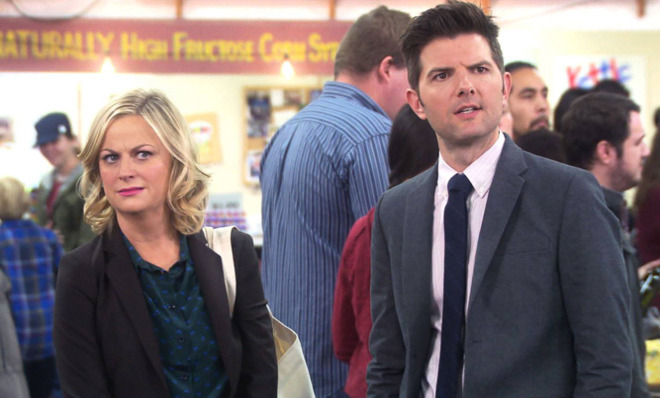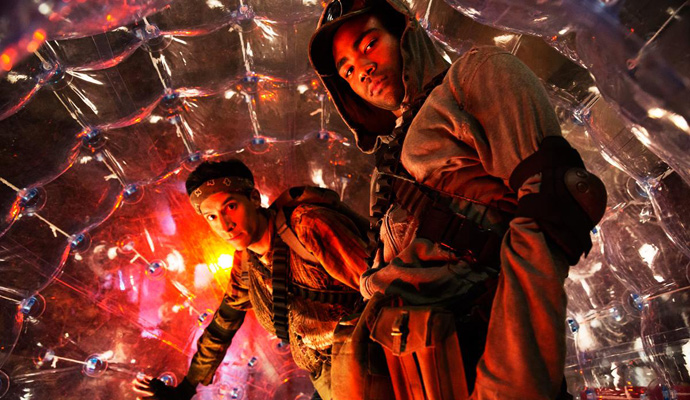What Parks & Recreation can learn from Community
Parks & Rec is in the middle of an uncharacteristically weak season — but it's not too late turn it all around


There was a time when the departure of two major cast members could mean the death of a show — but for NBC's Parks & Recreation, it might turn out to be exactly what the show needed. Let's be honest: Rashida Jones can be wonderful, but Parks & Recreation never figured out what to do with her. The quirks of Rob Lowe's character, Chris Traeger, had long since become grating.
Parks & Rec is in the middle of an uncharacteristically limp sixth season, and it's unclear how the show plans to turn things around. Fortunately, the show's writers don't have to look far for inspiration. In the middle of its sixth season, Parks & Recreation is facing the same challenges that Community faced when it premiered its fifth season in January.
Since then, Community has defied skeptics and soared, with a string of episodes that rival the very best in the show's run. What can Parks & Recreation learn from its sister show? A guide:
The Week
Escape your echo chamber. Get the facts behind the news, plus analysis from multiple perspectives.

Sign up for The Week's Free Newsletters
From our morning news briefing to a weekly Good News Newsletter, get the best of The Week delivered directly to your inbox.
From our morning news briefing to a weekly Good News Newsletter, get the best of The Week delivered directly to your inbox.
Throw out everything that isn't working
The best seasons of Parks & Recreation have used a single event as a backbone for stories: the third season's Harvest Festival, or the fourth season's city council race. By comparison, Parks & Recreation's sixth season has felt lumpy and unfocused. In just 13 episodes, we've seen Leslie recalled from office; Pawnee and Eagleton merge together; Chris and Ann move forward in their eternally unconvincing relationship; and everyone else mired in a variety of barely connected stories that include Ron's new marriage, Tom's experiences in the Pawnee business world, Andy's job with a charity in London, and Ben's recent appointment to city manager. (I don't even remember what April does anymore.)
None of it was fully formed, and the writers' attempts to cram so many tenuously connected stories into a half season has left Parks feeling disjointed.
It's a situation that recalls where Community was when it began its fifth season in January. Creator Dan Harmon came back to a Community that was totally different than the show he had left behind, and the fourth season had several bum stories left to resolve, including Chang's "Changnesia," the ongoing feud with City College, and Jeff's graduation from Greendale. How did Harmon handle all that excess baggage? As quickly and dismissively as possible. The premiere began with Jeff's law practice coming to an end, and within a half-hour he was back at Greendale as a teacher. "Changnesia" was dismissed in a single sentence.
A free daily email with the biggest news stories of the day – and the best features from TheWeek.com
Community has the benefit of a looser narrative, and Parks & Recreation can't exactly write off an entire weak season by saying there was a gas leak. But there's some dead weight in the first half of Parks & Recreation's sixth season — most notably, the undercooked Eagleton merger story — and I don't think anyone would object if the show cut its losses and moved on to a more coherent, compelling narrative in the back half of the season.
Say goodbye gracefully
This isn't the first time Parks & Recreation has weathered the departure of a major character. The end of the second season was also the final episode of Paul Schneider's Mark Brendanawicz. At the time, Parks & Rec producer Mike Schur said that the goal was that Schneider would "come back as soon as his schedule permits and as soon as the arcs we're writing call for it." This was supposed to happen as early as season three.
But it never did. Since his departure, it seems that Brendanawicz has been banished to the Phantom Zone. It's not just that the character has never reappeared; it's that the rest of the show's characters never even mention their longtime coworker and friend, who was supposedly leaving for another job in Pawnee.
In that case, it's a little jarring but excusable; Parks & Rec's third season was a quasi-reboot anyway, and there was no room left for Mark Brendanawicz. But Parks & Recreation can't write off Ann and Chris that easily. The show has reminded us, time and time again, that Ann is Leslie's best friend, and that Chris is Ben's best friend. Their departure should mean something — to the characters, who will need to adjust to life without them, and to the audience, who should feel the loss as much as the show's characters will.
But the first few episodes of Community's fifth season offer a master class in how a show can gracefully say goodbye to popular characters. Pierce looms large over the first few episodes, but in a way that's utterly true to the role he played throughout the show. Troy, who was arguably Community's most reliably funny character, is an even greater loss — but the show has wisely taken Donald Glover's departure as an excuse to explore different aspects of Abed (Danny Pudi), whose friendship with Troy had become something of a writer's crutch. Yes, it's a shame for a show to lose a major character — but it's also an opportunity for new layers of storytelling.

Bring in some new blood
It's not uncommon for an aging sitcom to introduce a new character in a desperate attempt to boost creative options and pump up the ratings. Historically, this has generally been a bad idea. (There's a reason for the existence of a sprawling list of shows that have introduced their own "Cousin Oliver.")
But Community has improbably managed to take the loss of two deeply funny cast members and turn it into a strength. To fill the gap left by Pierce Hawthorne, Community slotted in Professor Hickey (Jonathan Banks) — another old guy, but a character with intriguing wrinkles of his own that the show is carefully teasing out. Individual episodes have been fleshed out with top-notch guest stars like Walton Goggins and Nathan Fillion.
Like Community, Parks & Recreation has thrived on a cast so versatile that virtually all of its members have chemistry with each other. The kind of chemistry is delicate, and any new additions should be added with caution. That said, Parks & Rec has one of the deepest stables of supporting characters on television, so they clearly know how to enhance the world of Pawnee without shaking the show at its core. And let's not forget: the last time they added new cast members, we got Adam Scott and Rob Lowe.
Remember what made you great in the first place
Perhaps the greatest success of Community's fifth season is the way it has managed to recapture what made the show so special in the first place. At its strongest, Community used hilarious, genre-pushing inventiveness — a schoolwide paintball match, or a parallel universe, or a Dungeons and Dragons game — to tell surprisingly raw, emotional stories about a group of damaged people.
Parks & Recreation isn't that show, and it shouldn't try to be — but it should take some time to reflect on why its fans grew to love it so much. At its best, there's a warmth to Parks & Rec that stands out in the rest of the TV sitcom landscape. It's a show with optimism built into its DNA: a belief in relationships, in friendship, and in the fundamental ability of good, caring people to get things done. That feeling has been lost in the rocky, haphazard plotting of the sixth season.
And fortunately, there's one other thing that separates Parks & Rec from its fellow sitcoms: A willingness to evolve. This is a show that began with Amy Poehler as a clueless Michael Scott clone who wanted to build a park against the wishes of her quasi-villainous boss Ron Swanson. Parks & Rec became the best sitcom on TV because it spent years honing what worked and jettisoning what didn't — and there's nothing stopping them from doing so again.
Scott Meslow is the entertainment editor for TheWeek.com. He has written about film and television at publications including The Atlantic, POLITICO Magazine, and Vulture.
-
 Will SpaceX, OpenAI and Anthropic make 2026 the year of mega tech listings?
Will SpaceX, OpenAI and Anthropic make 2026 the year of mega tech listings?In Depth SpaceX float may come as soon as this year, and would be the largest IPO in history
-
 Reforming the House of Lords
Reforming the House of LordsThe Explainer Keir Starmer’s government regards reform of the House of Lords as ‘long overdue and essential’
-
 Sudoku: February 2026
Sudoku: February 2026Puzzles The daily medium sudoku puzzle from The Week
